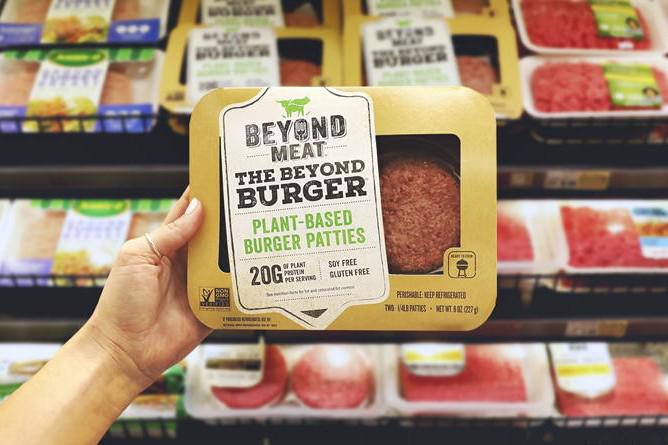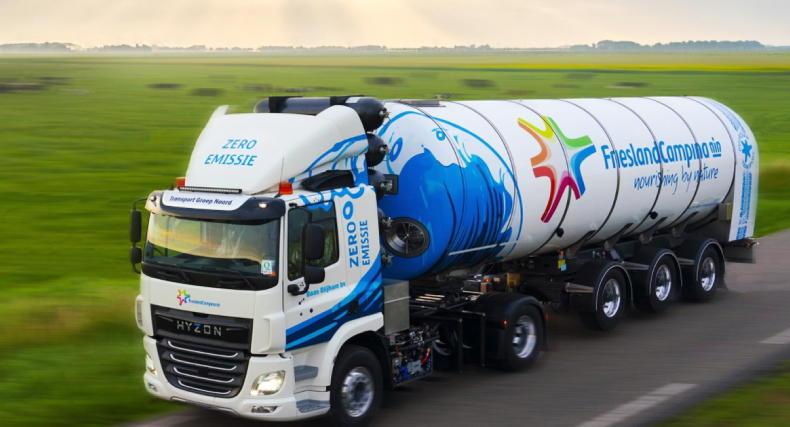Beyond Meat has just reported another set of quarterly results that show a further decline in sales and bottom-line losses. This is despite having listings with several major retailers around the world and being the supplier of the plant-based burger offering in McDonald’s. This is happening at a time when there has been a sustained negative focus on meat, with the latest push back being the declaration from the organisers of the Paris Olympics that 60% of the food served at the games will be meat-free.
This is being represented as an effort to reduce the carbon footprint of the games and whatever about the success of the ambition, it has certainly gained plenty of publicity.
Beyond Meat
However, returning to the problems at Beyond Meat, the diagnosis is quite simple, in that the company simply isn’t generating sufficient sales to support the production and marketing infrastructure that the business has. Sales have continued to fall, down to $75.6m (€70.6m) for the quarter ending 31 March, compared with $92.2m (€86.2m) in the same period last year.
This represents eight quarters in a row where revenue has failed to match the corresponding previous quarter; though there is small comfort from the levels of losses reducing in the first quarter of 2024 to $54.4m (€50.8m) compared with a $59m (€55m) loss in the first quarter of 2023.
This means that for every of euro-worth of product sold by Beyond Meat in the first quarter of 2024, it lost 72c.
Clearly this isn’t a sustainable model for any business. The company share price started trading this week at $7.16 (€6.63), a massive 33 times less than the $240/share value it reached when the company was first launched on the New York stock exchange in 2019, supported by a plethora of celebrity investors. Despite its high profile, it has never made a profit and has now reached the point where it has burned through its reserves to such an extent, that it will have to raise further capital – which isn’t straightforward, given the company’s track record of performance to date.
Back in February at the publication of the results for 2023, the company guided that the 2024 results would have a positive gross margin and that it would achieve a 25% reduction in operating costs for the business. Barron’s, the US business publication, reported that Beyond Meat CEO Ethan Walden Brown said on the earnings call that “we are taking steps to bolster the balance sheet”.
The core problem of not attracting sufficient sales has been attributed to the combination of the highly processed product having a high cost, as well as an unhealthy image. The company has attempted to address this, with Barron’s reporting that the latest incarnation of its burgers has achieved a 60% reduction in saturated fat to 2g per serving by using avocado oil and 20% less sodium, but the downside of this is that it is even more expensive to produce than the previous product.
Negative reviews
The problem of developing sales is a wider industry that isn’t confined to Beyond Meat. By way of example, the BBC reported this time last year that Heck, a family business based in Yorkshire, England, was slashing its plant-based burger range from 10 product lines to two. It quoted co -founder Jamie Keeble as saying that consumers were “not there yet” when it came to buying these products.
Even food writers who might be considered well disposed towards the category have been having second thoughts. Writing in the Guardian last August, Aine Carlin, publisher of three vegan cookbooks, wrote that: “I’m only amazed that our collective love affair with fake meat lasted as long as it did,” and that “it just doesn’t taste that good.”
Kantar, the leading marketing data and analytics company that has a particularly strong insight into the UK food retail sector, has identified the lack of a brand strategy as the missing ingredient for meat-free products.
In a report done in June last year, it highlighted three areas: cost, health and animal welfare – as a problem for the category. The first issue was price sensitivity, which was dominating consumer purchasing decisions and the highly processed nature of the products meant they didn’t have high healthy credentials.
Also while animal welfare is important to consumers, just 14% of consumers identify as vegetarian and a growing category of flexitarians, who are people that choose to eat less meat but not abstaining all together.
Farmers and the wider meat processing industry will have little sympathy for the difficulties being experienced by the category whose ambition was to replace the meat products that originate on farms across the world. It is clear that the fake meat sector underestimated how robust the real meat category is and the loyalty it attracts from consumers across the world.
However, farmers and the meat industry can never afford to be complacent, just because of the struggles being experienced by those that set out to replace them. Consumers will remain loyal so long as real meat offers value and meets their expectations on value, welfare and sustainability, but investment in plant and laboratory-based substitute products for meat will continue.
There may well come a point in future where a product is developed that attracts consumers and is commercially viable. At the moment, real meat holds the upper hand in this battle, the challenge is to keep it that way.
In brief
Beyond Meat lost €50.8m in Q1.Revenue down to €70.6m from €86.2m last year.Olympics want 60% food served to be meat free.Cost and processed nature of product damage image.Industry-wide problem, not just at Beyond Meat.
Beyond Meat has just reported another set of quarterly results that show a further decline in sales and bottom-line losses. This is despite having listings with several major retailers around the world and being the supplier of the plant-based burger offering in McDonald’s. This is happening at a time when there has been a sustained negative focus on meat, with the latest push back being the declaration from the organisers of the Paris Olympics that 60% of the food served at the games will be meat-free.
This is being represented as an effort to reduce the carbon footprint of the games and whatever about the success of the ambition, it has certainly gained plenty of publicity.
Beyond Meat
However, returning to the problems at Beyond Meat, the diagnosis is quite simple, in that the company simply isn’t generating sufficient sales to support the production and marketing infrastructure that the business has. Sales have continued to fall, down to $75.6m (€70.6m) for the quarter ending 31 March, compared with $92.2m (€86.2m) in the same period last year.
This represents eight quarters in a row where revenue has failed to match the corresponding previous quarter; though there is small comfort from the levels of losses reducing in the first quarter of 2024 to $54.4m (€50.8m) compared with a $59m (€55m) loss in the first quarter of 2023.
This means that for every of euro-worth of product sold by Beyond Meat in the first quarter of 2024, it lost 72c.
Clearly this isn’t a sustainable model for any business. The company share price started trading this week at $7.16 (€6.63), a massive 33 times less than the $240/share value it reached when the company was first launched on the New York stock exchange in 2019, supported by a plethora of celebrity investors. Despite its high profile, it has never made a profit and has now reached the point where it has burned through its reserves to such an extent, that it will have to raise further capital – which isn’t straightforward, given the company’s track record of performance to date.
Back in February at the publication of the results for 2023, the company guided that the 2024 results would have a positive gross margin and that it would achieve a 25% reduction in operating costs for the business. Barron’s, the US business publication, reported that Beyond Meat CEO Ethan Walden Brown said on the earnings call that “we are taking steps to bolster the balance sheet”.
The core problem of not attracting sufficient sales has been attributed to the combination of the highly processed product having a high cost, as well as an unhealthy image. The company has attempted to address this, with Barron’s reporting that the latest incarnation of its burgers has achieved a 60% reduction in saturated fat to 2g per serving by using avocado oil and 20% less sodium, but the downside of this is that it is even more expensive to produce than the previous product.
Negative reviews
The problem of developing sales is a wider industry that isn’t confined to Beyond Meat. By way of example, the BBC reported this time last year that Heck, a family business based in Yorkshire, England, was slashing its plant-based burger range from 10 product lines to two. It quoted co -founder Jamie Keeble as saying that consumers were “not there yet” when it came to buying these products.
Even food writers who might be considered well disposed towards the category have been having second thoughts. Writing in the Guardian last August, Aine Carlin, publisher of three vegan cookbooks, wrote that: “I’m only amazed that our collective love affair with fake meat lasted as long as it did,” and that “it just doesn’t taste that good.”
Kantar, the leading marketing data and analytics company that has a particularly strong insight into the UK food retail sector, has identified the lack of a brand strategy as the missing ingredient for meat-free products.
In a report done in June last year, it highlighted three areas: cost, health and animal welfare – as a problem for the category. The first issue was price sensitivity, which was dominating consumer purchasing decisions and the highly processed nature of the products meant they didn’t have high healthy credentials.
Also while animal welfare is important to consumers, just 14% of consumers identify as vegetarian and a growing category of flexitarians, who are people that choose to eat less meat but not abstaining all together.
Farmers and the wider meat processing industry will have little sympathy for the difficulties being experienced by the category whose ambition was to replace the meat products that originate on farms across the world. It is clear that the fake meat sector underestimated how robust the real meat category is and the loyalty it attracts from consumers across the world.
However, farmers and the meat industry can never afford to be complacent, just because of the struggles being experienced by those that set out to replace them. Consumers will remain loyal so long as real meat offers value and meets their expectations on value, welfare and sustainability, but investment in plant and laboratory-based substitute products for meat will continue.
There may well come a point in future where a product is developed that attracts consumers and is commercially viable. At the moment, real meat holds the upper hand in this battle, the challenge is to keep it that way.
In brief
Beyond Meat lost €50.8m in Q1.Revenue down to €70.6m from €86.2m last year.Olympics want 60% food served to be meat free.Cost and processed nature of product damage image.Industry-wide problem, not just at Beyond Meat. 









SHARING OPTIONS